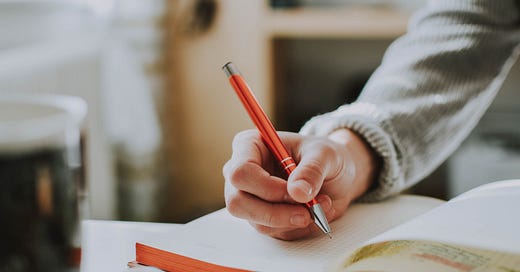I have always loved to write. As soon as I could hold a pencil, I wrote stories about my stuffed animals, and read them out loud. I self-published my first book in second grade, as a class assignment to introduce myself to the class. Made of sturdy cardstock wrapped in blue contact paper with little white flowers, the cover proudly held the title “My Life: by Crystal Oxner.”
In Write for Your Life, Anna Quinlen’s tells the story of Anne Frank:
When she first began, Anne Frank wasn’t writing a book. She was talking to herself. … She was finding solace in writing her life …
As a teenager, I did something similar. I filled journals with poems written wrestling with heavy emotions: sadness, love, envy, fear. When I didn’t know how to tell my mom what I was going through, I’d write her a letter instead. The written word helped me make sense of the world. Like Anne Frank, I found solace in writing too. Unfortunately, those earliest journals are all lost now. The oldest one I can find is from my college years. Most entries begin something like this:
Dear God, I am feeling so out of sorts.
Writing became the way I prayed. I felt silly talking to God out loud. Someone might hear me and think I had lost my mind. But with paper and pen, I could say anything. In this way, God became my best friend. God knew it all anyway. There was no need to hold anything back.
Quindlen later writes,
Writing can lead to reflection, reflection can lead to understanding, understanding can lead to happiness.
When working with writing mentors on deep edits for some very emotional essays several years ago, I found myself at a sticking point. I knew I needed to dig deeper, but I didn’t know where to start. I sat at the library table staring at my computer screen. I had good comments in front of me. The critiques I received were helpful and well-meaning, but I had no idea where to start. So I closed the computer, picked up a pen, and began to copy the words from the printed page. I wasn’t writing anything new, I was simply copying words I had already written. Before I knew it, I was making connections and remembering details I hadn’t thought of before.
Studies have shown our brains are more active when writing by hand than when we type on a keyboard. Something about our hands moving across the page triggers our brain to connect dots that just doesn’t happen the same way on a screen.
There’s more activity in the sensorimotor part of the brain. This makes sense. When we write, more of our senses are activated. We feel the pen or pencil in our hand, we feel the tension as it guides across the page. We hear the scratch along the paper. We see the ink color the blank page. Sometimes we even smell the ink.
This was a huge breakthrough for my writing process. Rewriting the entire essay by hand helped my brain make connections I wasn’t making otherwise. I have continued this practice of longhand writing for every project since. The journals are piling up on my bookshelf, proof of the work that is being done.
If you’re interested in reading more on those writing studies I referred to, I like this article from 2020 and this one from 2021.
Write for Your Life by Anna Quindlen was the inspiration for this month’s theme. It’s a short and quick read and illustrates the power of writing for everyone, not just those of us that call ourselves “Writers.”
The Power of Writing it Down challenges readers to write for just twenty minutes a day. Sometimes we just need someone to tell us what to do.
Have you read The Dictionary of Lost Words? A fantastic story of the history behind the Oxford Dictionary, it includes so many great quotes about the power of reading and writing.
Journal for just FIVE minutes every day for the next two weeks. You can do it in the bathroom, stay in your car after grocery shopping, or go to bed early with a glass of hot tea or wine. Set a timer and just write. Don’t pick up your pen until the timer stops. Don’t know what to write about? Start by writing: Today was such a blur, I don’t even know where to start.
Write a Six Word Memoir. It can be about your life, your childhood, your year, your day, your month. What six words sum up a part of your life?
Write about where you’re from. Use my Where I’m From as a bit of background.
If you would like to share something you write this month, I’d love to read it! You can leave it in the comments or email it to me.
Happy writing! “See” you next month,
Find me on Instagram | Website | The Blog







